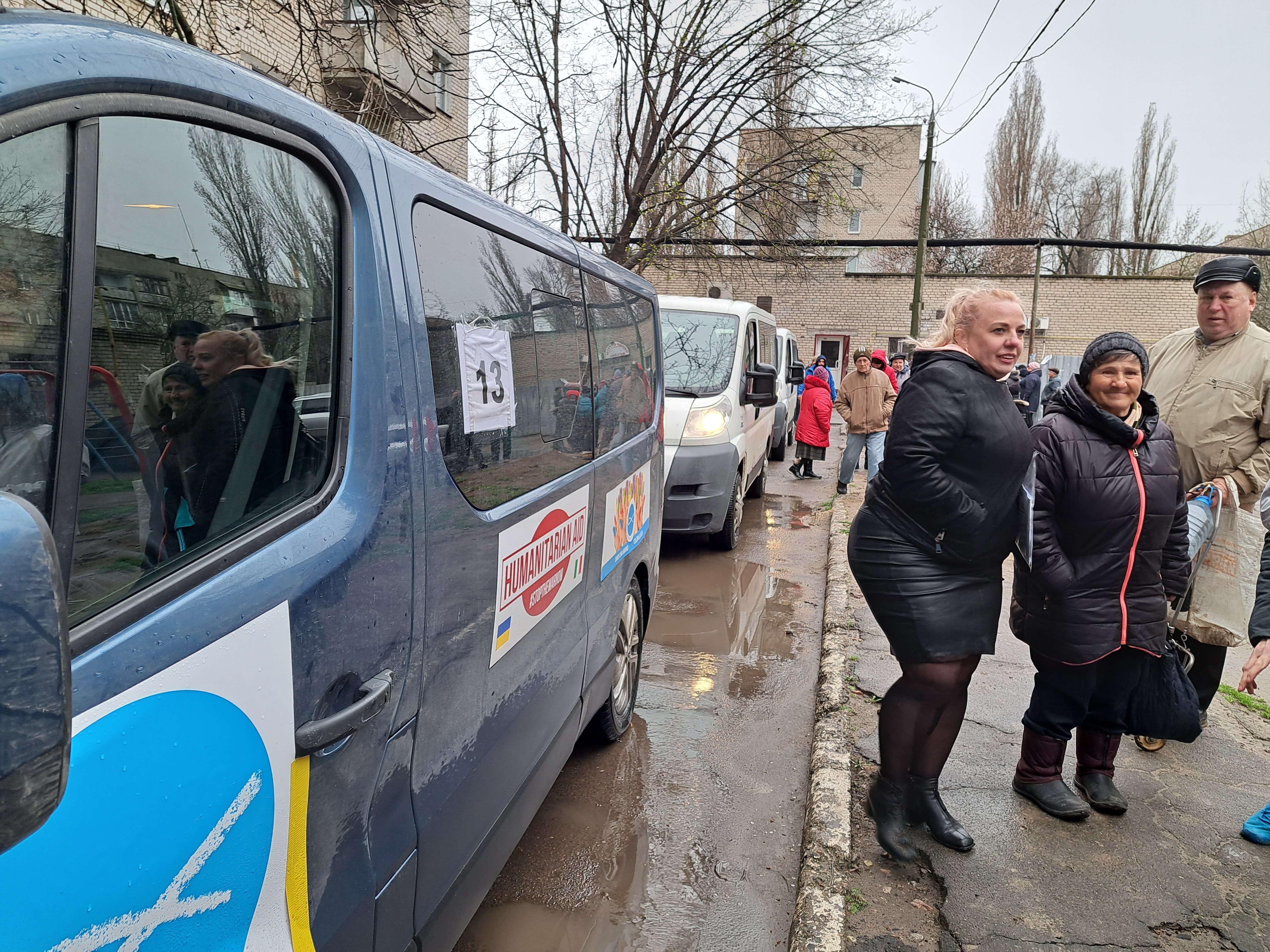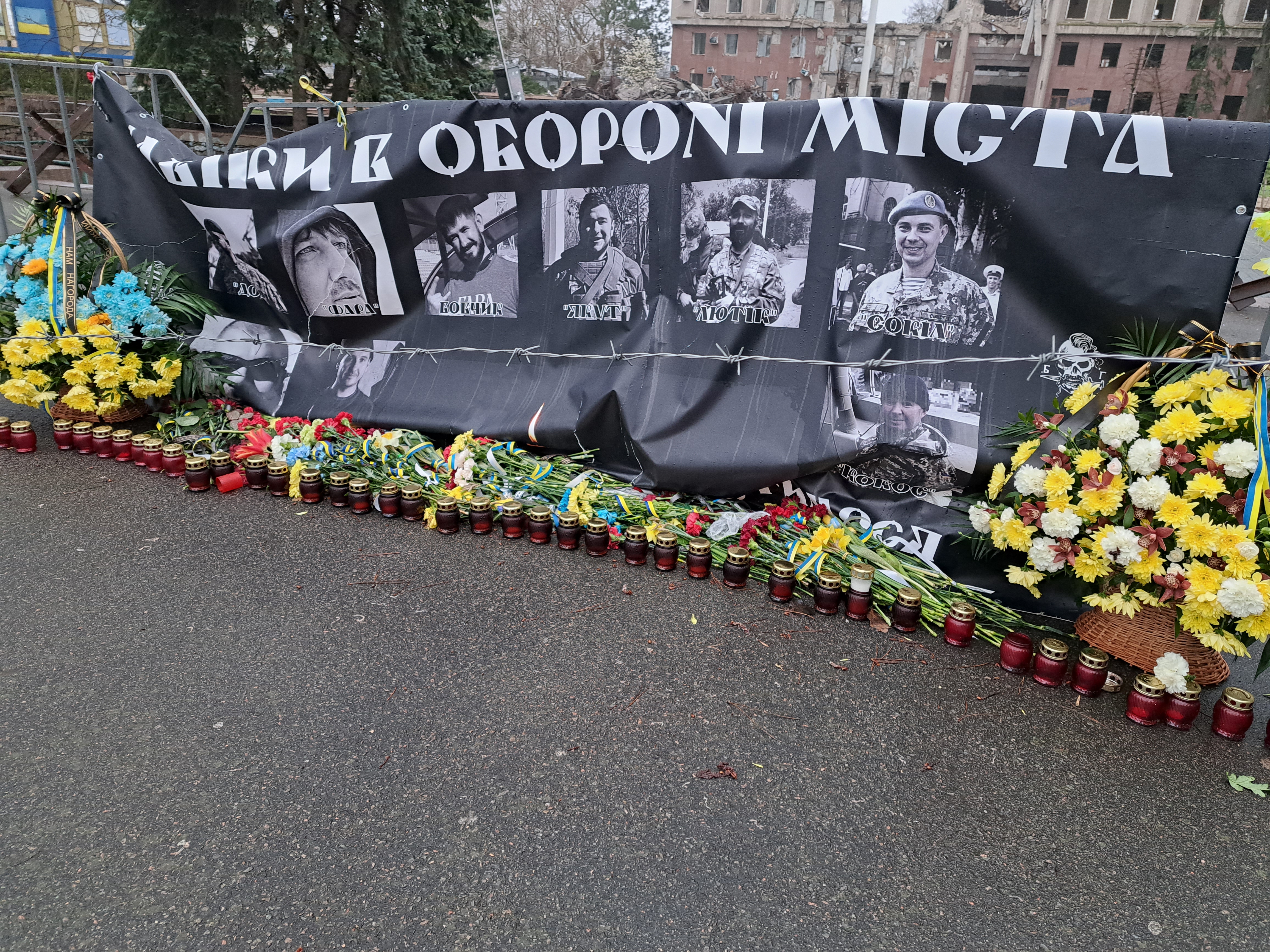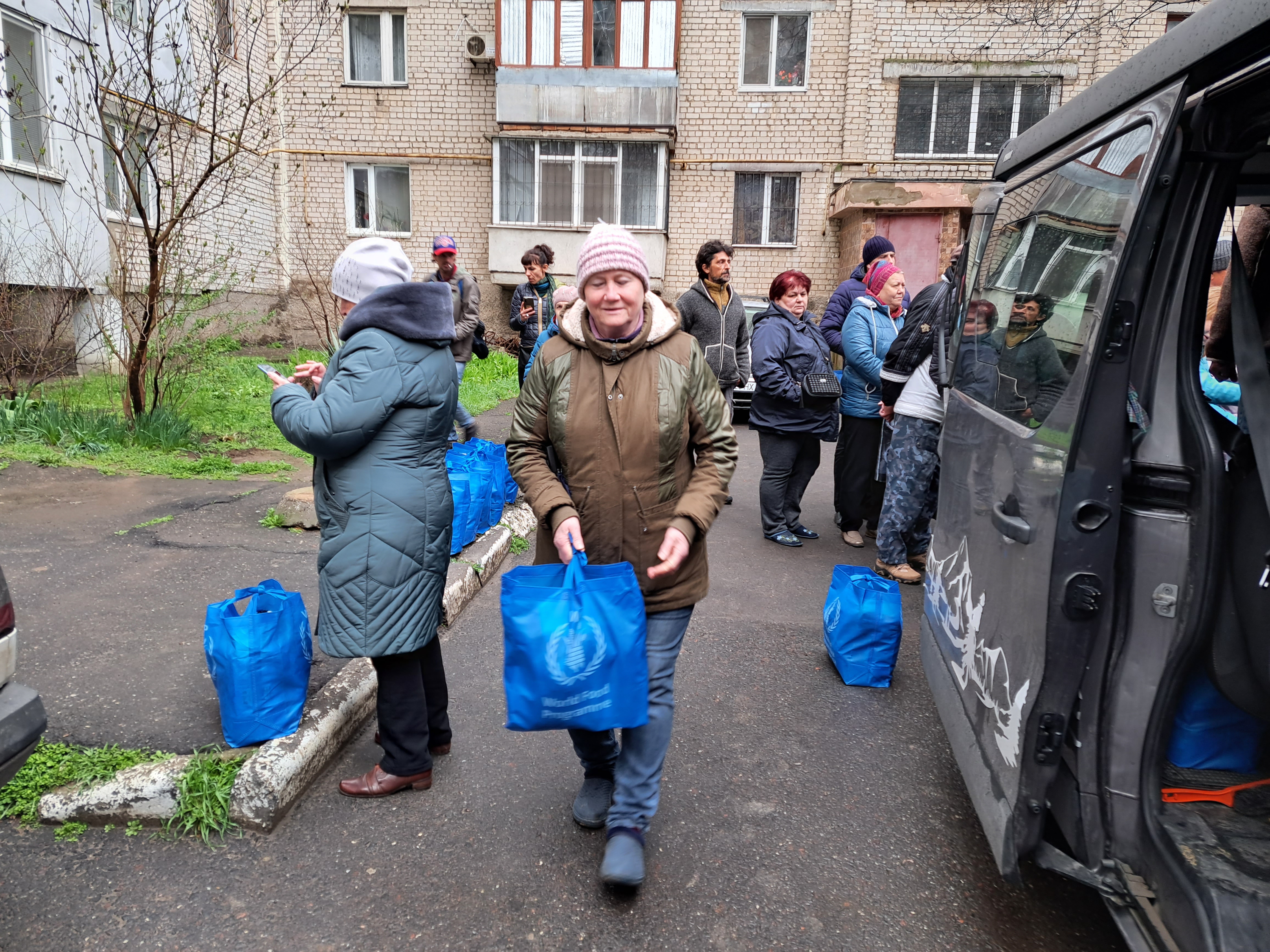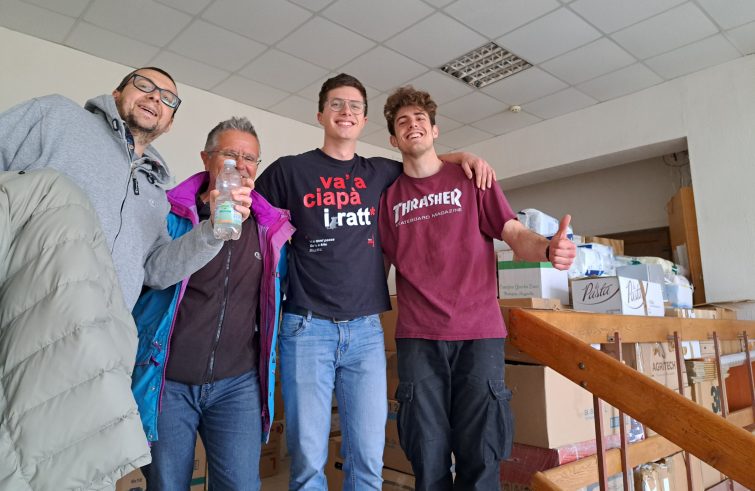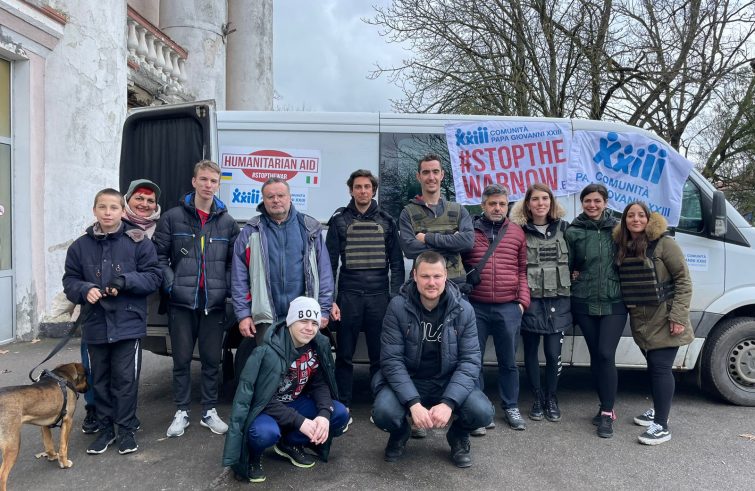
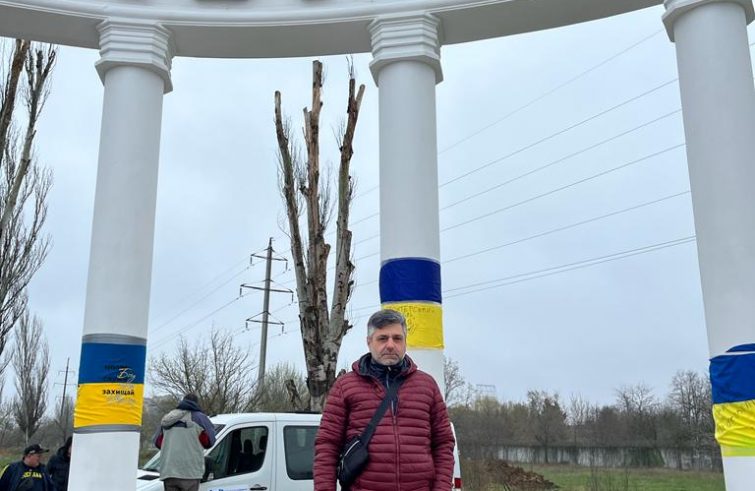 (from Iasi) Kherson – where Ukrainian and Russian soldiers are still fighting on the opposite river banks – was the last destination of the #StopTheWarNow Network’s peace caravan. A group of 150 people representing 180 very diverse Catholic and civil society movements and associations arrived with 30 vans loaded with humanitarian aids and 25 power generators. For security reasons, only a small delegation travelled to Kherson in a minibus loaded with humanitarian supplies. The parcels were unloaded at the House of Culture, now converted into a distribution centre – surrounded by rubble and destruction. The sound of rockets and shelling can be heard in the background. “Utter devastation is visible throughout the city – now freed from Russian occupation”, recounts Gianpiero Cofano, coordinator of the #StopTheWarNow network. “There are very few people on the streets and very few vehicles. It is a very critical situation. Although on this side the Dnieper River the city of Kherson has been freed, people are still living in fear and uncertainty. From the war front, one can hardly imagine a different future here.” While Kherson is a seriously wounded city, Odessa and Mykolaiv are marked by a semblance of tranquillity and safety.
(from Iasi) Kherson – where Ukrainian and Russian soldiers are still fighting on the opposite river banks – was the last destination of the #StopTheWarNow Network’s peace caravan. A group of 150 people representing 180 very diverse Catholic and civil society movements and associations arrived with 30 vans loaded with humanitarian aids and 25 power generators. For security reasons, only a small delegation travelled to Kherson in a minibus loaded with humanitarian supplies. The parcels were unloaded at the House of Culture, now converted into a distribution centre – surrounded by rubble and destruction. The sound of rockets and shelling can be heard in the background. “Utter devastation is visible throughout the city – now freed from Russian occupation”, recounts Gianpiero Cofano, coordinator of the #StopTheWarNow network. “There are very few people on the streets and very few vehicles. It is a very critical situation. Although on this side the Dnieper River the city of Kherson has been freed, people are still living in fear and uncertainty. From the war front, one can hardly imagine a different future here.” While Kherson is a seriously wounded city, Odessa and Mykolaiv are marked by a semblance of tranquillity and safety.
“But the big hanging question – adds Cofano – is whether the bombings will resume with the warm weather, with more people having to flee from the Russian forces’ advance.
- (Foto sir)
- Foto sir
- Foto Sir
How is the situation likely to play out?
Over the past few days we had two online meetings with the Italian ambassador and the apostolic nuncio in Ukraine. Diplomats normally tend to sugarcoat the situation, or use convoluted language to say they are working to find solutions, thereby attempting to reassure the general public. However, both dignitaries said that diplomatic talks are dead in the water.
There is no prospect of dialogue or negotiation, which is frightening. The fact that the entire world is unable to find the right words to engage in dialogue and reach an agreement is alarming.
Is there a way out of this stalemate?
I was surprised to hear that the Brits and now also the Italians are convening conferences for reconstruction. Whoever is doing such a thing now is a shark, seeking to profit from these people who are dying.
There needs to be a peace conference, not a reconstruction conference.
Granted, there are aqueducts, bridges, infrastructure, roads, universities to be rebuilt, but this is a country that is currently at war. Let us first work to re-establish peace and then start to rebuild people’s hearts and relationships. These people are shaken to the core.
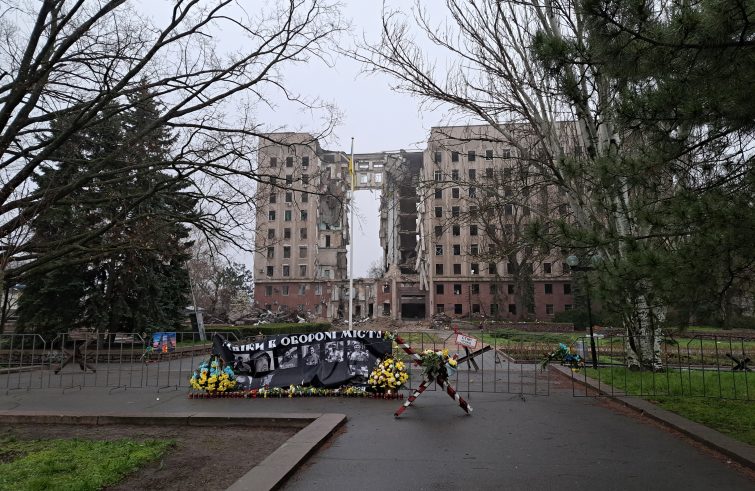 During an online meeting with you, Cardinal Zuppi asked if you could help identify “with imagination and creativity, the most appropriate course of action for showing our closeness to the population.” Which emergency situation touched you most?
During an online meeting with you, Cardinal Zuppi asked if you could help identify “with imagination and creativity, the most appropriate course of action for showing our closeness to the population.” Which emergency situation touched you most?
One emergency situation that we would like to address specifically is the issue of children and schooling. Children here lived through two years of pandemic, as we did. But the pandemic was followed by the outbreak of war. They missed three school years at least. In the vast majority, students use their parents’ mobile phones for distance learning. But often there is no signal. There are frequent power outages.
Missing three years of school means missing the future of the next 50 years.
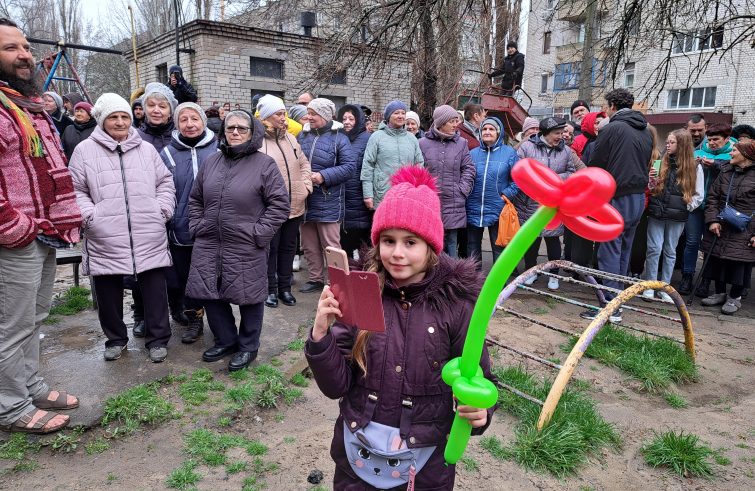 Over 150 people representing 180 different associations are present here. Which part of Italy has come to Ukraine?
Over 150 people representing 180 different associations are present here. Which part of Italy has come to Ukraine?
It’s that part of Italy which will not remain indifferent, which has at heart the future of peace in this country not because it fears rising utility bills or the economic impact of this war on Italians’ savings. Those who joined the Caravan did so because they wanted to say to Italy not to forget the Ukrainian people; to express solidarity and closeness; to urge our political leaders to work towards negotiations.
We firmly believe that peace is also the result of a bottom-up thrust.
It’s a planned dream. Don Oreste Benzi used to teach us that beautiful things are first achieved and then conceived. When we set off with the first Caravan we had no idea as to what could come next. We dreamed of doing something but we didn’t know exactly what. Everything we have accomplished in these past months we discovered together, simply by doing it step by step. And yet it’s all the result of a dream. It is therefore necessary to have this propensity to dream. If this propensity is missing, it means that we became dying men and women.
It is the message that Pope Francis has sent out on so many occasions: not resigning oneself means having a propensity to dream. Not everything will come true and not everything turns out according to our plans, but we must not stop dreaming and planning for the future.

